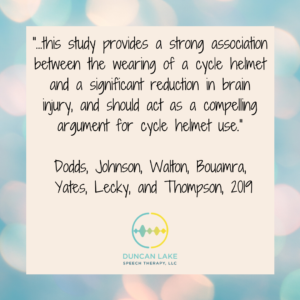I threw out some bike/helmet statistics earlier in the week on our Facebook page. Largely, these statistics showed that helmet wearing can prevent head injury. I wanted to dive a little further into this topic because, as the weather continues to improve (IN THEORY) here in the state of Michigan, and as the idea of sheltering-in-place and social distancing start to become more normal than not, bike riding is going to be on the rise. It’s a great family activity, and it encourages movement and the outdoors, both of which are important to our mental well-being.
I also have a vested interest in this particular topic. As a speech-language pathologist, I have worked with (and can work with) individuals with traumatic brain injury (TBI). In fact, during one of our graduate school TBI clinics, a disproportionate number of clients we saw that semester resulted from a bike or skateboarding accident. Having witnessed the long-term effects of these kinds of brain injuries, I would like to share some information that could prevent them. So, TAH-DAH, we are doing a research rumination.

I chose this article in particular because it was drawn from a UK-based demographic. Cycling is much more common in Europe, so I figured the pool of information would be larger.
Let’s dive in. I’m going to break this thing down just like the TV version of Outlander!
Title: “Evaluating the impact of cycle helmet use on severe traumatic brain injury and death in a national cohort of over 11000 pedal cyclists: a retrospective study from the NHS England Trauma Audit and Research Network dataset” by Nick Dodds, Rowena Johnson, Benjamin Walton, Omar Bouamra, David Yates, Fiona Elizabeth Lecky, and Julian Thompson
Purpose: To determine the effect of bike helmet wearing on the amount/severity of head injury coming into UK hospitals.
What’d they do?: The researchers completed review of 5 years worth of data on the National Health Service’s Trauma Audit and Research Network (TARN). This system collects data fro, among many other things, individuals who came into the hospitals with brain injury related to cycling. 6,621 cases (all over the age of 16) in the system had helmet-related information. The researchers used these numbers to compare injury vs. non-injury and death rates among those who did and didn’t wear helmets.
Results: Several interesting findings were noted in the study.
- The bike-injury death rate was significantly lower for people who wore helmets. 1.8% of individuals who wore helmets died within 30 days of injury vs. 5.6% of those who didn’t.
- TBI occurred in 47.6% of patients not wearing helmets vs. 19.1% of patients wearing helmets.
- People with helmets were more likely to suffer from chest, spinal, and upper and lower limb injuries. Even in these instances, brain injury for helmeted riders was still lower.
- Riders with helmets were less likely to suffer from facial injuries than those who did not wear helmets.
What does this mean?
In short, this means you need to wear a helmet.
Listen. I hate helmets. They are uncomfortable. The chin strap makes gag a little. If the result of wearing a helmet is that you are safer on your bike, though, then it would make sense to just wear it.
This study only included people over the age of 16, and it doesn’t report on the small kiddos. I’ll save that upbeat research article for a different day. Until then, call your local bike shop and get a helmet!

